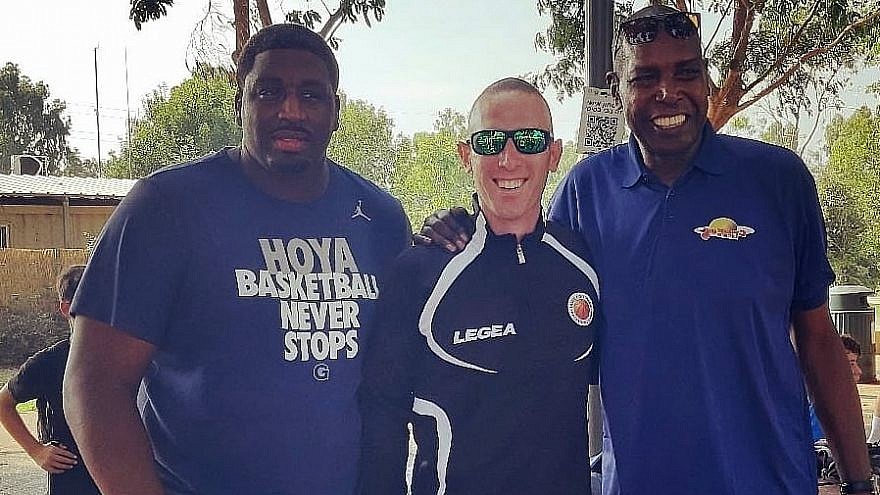Mike Sweetney had it all.
Named the best high school basketball player in the Washington, D.C., area in 2000, he then joined the list of star centers for Georgetown University. At Georgetown, he averaged 18.2 points and left his mark as seventh in career scoring, fifth in career rebounds and sixth in career blocks. He was drafted by the New York Knicks as the ninth overall pick in the 2003 NBA draft.
Sweetney, 36, had fortune, fame and a career doing what he loved best, but then tragedy struck. His father died suddenly from a heart attack, just days before he had to report to the Knicks’ training camp. The loss sent him spiraling into a depression that made it impossible for him to focus on basketball.
Sweetney struggled in the NBA, revealing recently that he even tried to commit suicide during his rookie season. After four unsuccessful years, he played overseas for 12 years, and now dedicates himself to raising awareness about mental-health issues, and the importance of seeking and receiving assistance.
JNS talked with Sweetney last week in Jerusalem during his first-ever visit to Israel. This interview has been edited for brevity and clarity.
Q: What did you know or hear about Israel during your college and professional basketball days?
A: I didn’t know that much about it. From the news, it always sounded like it was a pretty rough place, but when I played ball overseas, I kept hearing other players saying how their goal is to play in Israel so I knew it couldn’t be that bad.
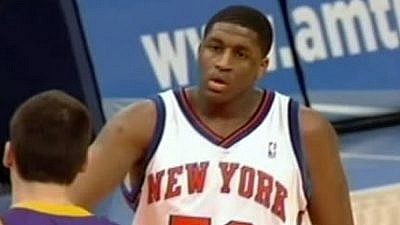
Q: Did you have any connection to the Jewish people, especially playing in New York?
A: My only connection to Jews was my friendship with [Israeli-American former pro-basketball player] Tamir Goodman. The two of us played together in the Capital Classic, one of the most prominent high school all-star games. We even won co-MVP of the game together!
I knew the kipah meant something religious, and I respected that.
Tamir is one of the most amazing people I ever met. He is always smiling and always in a great mood. I admired him so much, and wondered how anyone could never get upset and be so happy. It was also incredible how we would literally give the shirt off his back to help anyone in need. So my only connection to Judaism was an extremely positive one.
Q: Since you brought up Tamir, did you think it was strange that he played with a kipah on his head? I was actually at that Capital Classic game when you played together with him and wondered what the 20,000 people in the arena thought about his kipah.
A: I don’t know about everyone else in the arena, but I never saw Tamir as being different. I knew the kipah meant something religious, and I respected that. I never asked him about it and just saw him as one of the guys. We became close and have been in touch for 20 years.
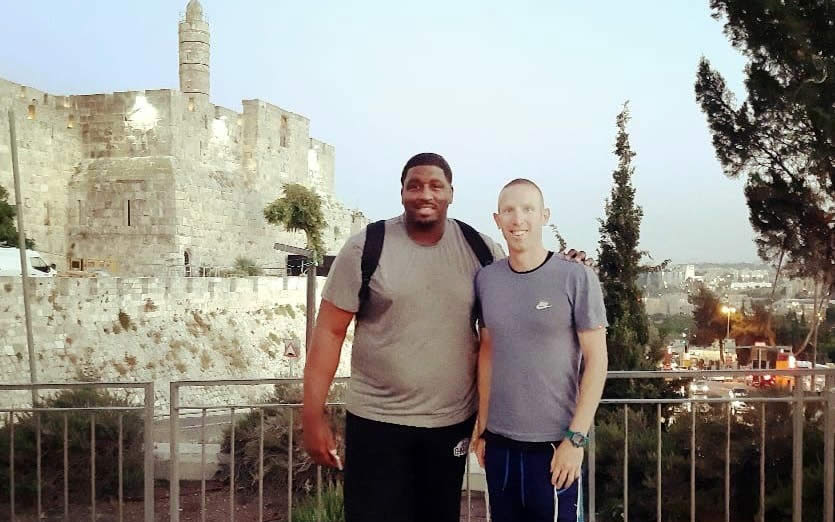
Q: So you got to the NBA, the ninth pick in the same draft in which LeBron James was chosen as No. 1. But you struggled after your dad passed away. What happened?
A: My father dying was the hardest thing I ever had to deal with in my life. He was my best friend and mentor. He was the one who introduced me to basketball. My dad attended every single college game that I played. Not having him by my side during that should have been the greatest moments of my life threw me into depression.
I didn’t realize then that I was suffering from depression, but I was in a very dark place and could not get out of it. Basketball was my only outlet to distract me, but I could not succeed in basketball without my dad.
So, I was caught in a vicious cycle of sadness that spiraled me to deeper and deeper darkness. I lost my NBA career, and I almost lost my family because of it. I can tell you one thing I learned from that experience: Money doesn’t buy happiness.
It amazes me how everything is so family-oriented.
Q: How were you able to get out of that dark place and depression?
A: I remembered the things which my dad taught me about God. I connected to my church, prayed a lot and decided to let God handle things. I was trying to do things my way, and I was not following His lead. Once I started getting things together spiritually, I was able to connect to what truly makes one happy and what truly matters—God and family. That’s when things started turning around for me.
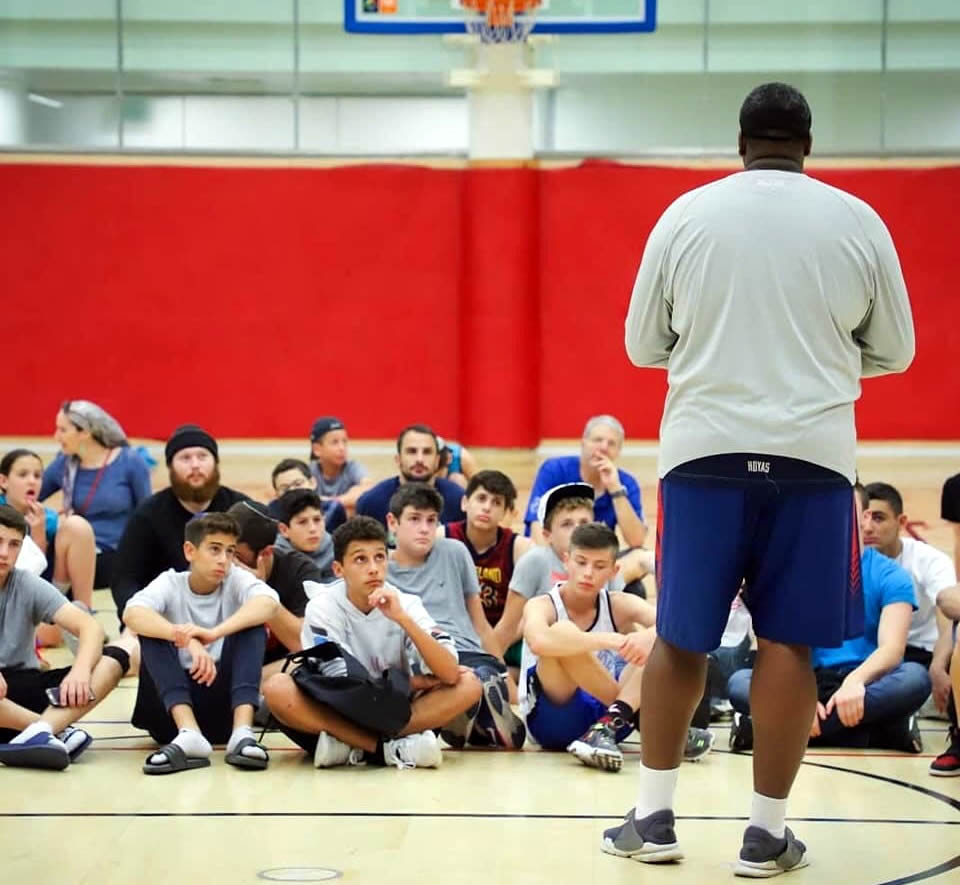
Q: How did you end up coming to Israel?
A: I knew through my religious faith that Israel was a special place; it’s the Holy Land. But I had never been. I saw that my good friend, Tamir, was advertising that he was holding a summer camp in Jerusalem. So I contacted him to see if he could use my help as a coach. Next thing I knew, I was planning my visit.
Q: How has your first-ever visit to Israel been for you?
A: Let me start by saying that if my wife and three children were here with me now, I don’t think I would be able to get on that plane and leave at the end of the trip. I went from the airport to my hotel and didn’t even unpack. I left straight for the Western Wall. Being there, and walking in the Old City, was surreal for me. I was seeing and walking in the places which I read about in the Bible. Words cannot explain the feeling.
It has also been special being reunited with Tamir and working with all these great kids in the basketball camp in Jerusalem. I plan to come back next summer with my family. I really don’t know how I will be able to leave.
I was in a very dark place and could not get out of it.
Q: What message do you have for people around the world about Israel?
A: Don’t believe what you see in the news. The people here are so nice and loving. No words that I say can describe how peaceful it is here. You have to come here to experience it yourself. Where else in the world can young children play in the park at 12 a.m.?
I saw children playing and asked Tamir, “Where are their parents?” He told me that children in Israel have freedom to just be kids and parents don’t have to worry. The news tell us that Israel is a war zone. I don’t know—in the United States, I would never let my child ride a bus alone and here in Israel that is the norm. So, you tell me: Which place is more dangerous?
It also amazes me how everything here is so family-oriented and how family is so important to the people of Israel. This has been the most incredible experience of my life, and I cannot wait to come back.
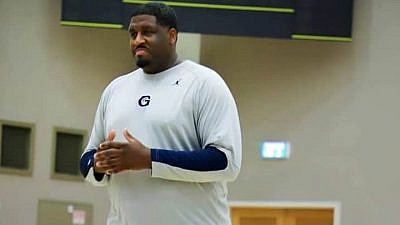
Q: What’s next for Mike Sweetney now that your playing days are over?
A: My family recently moved to Bergen County in New Jersey. I coach youth basketball, do personal training, and most importantly, speak publicly about acknowledging and confronting mental health, and inspiring people to focus on what is truly important in life. It is such a blessing that I am both mentally and spiritually in a great place, and can now inspire others.
Q: Bergen County and the areas around it encompass many Jews and people who love Israel. Are you available to speak at their schools, synagogues and community events?
A: That would be incredibly special for me. I love Israel and the Jewish people so much, and would welcome the chance to coach, train and speak in the Jewish community throughout the tri-state area. They can reach me at sweetney5050@gmail.com.
Q: Any last words you want to share?
A: Next year in Jerusalem!


























